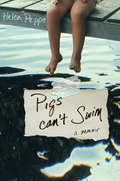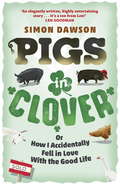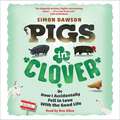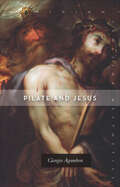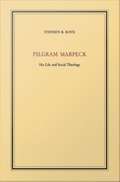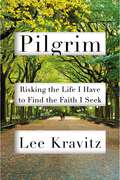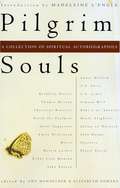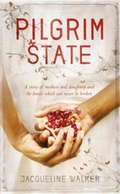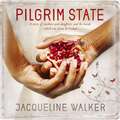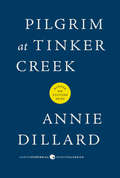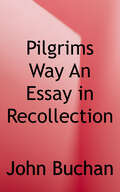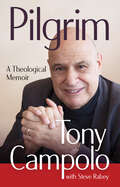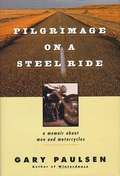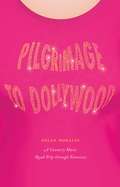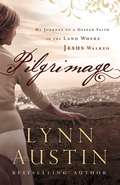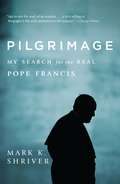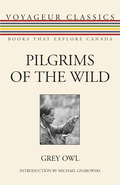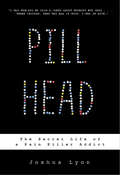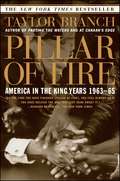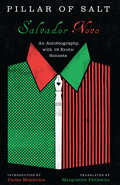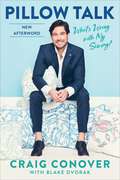- Table View
- List View
Pigs Can't Swim: A Memoir (A Merloyd Lawrence Book)
by Helen PeppeAn outrageous, hilarious, and touching memoir by the youngest of nine children in a hardscrabble, beyond-eccentric Maine family. With everything happening on Helen Peppe’s backwoods Maine farm, life was wild--and not just for the animals. Sibling rivalry, rock-bottom poverty, feral male chauvinism, sex in the hayloft: everything seemed--and was--out of control. In telling her wayward family tale, Peppe manages deadpan humor, an unerring eye for the absurd, and poignant compassion for her utterly overwhelmed parents. While her feisty resilience and candor will inevitably remind readers of Jeannette Walls or Mary Karr, Peppe's wry insight and moments of tenderness with family and animals are entirely her own. As Richard Hoffman, the author of Half the House: A Memoir puts it: "Pigs Can't Swim is an unruly, joyous troublemaker of a book. "
Pigs in Clover: Or How I Accidentally Fell in Love with the Good Life
by Simon DawsonThis is the true story of a Londoner who gives up his job as an estate agent in the city, moves to the wilds of Exmoor, starts a smallholding and becomes self-sufficient, with a few bumps along the way. Simon's journey from urbanite to self-sufficient smallholder is brimming with incidents - some funny and some tragic - leading him to question Mother Nature, himself, the food he eats, and his role in it all. Which makes the transition from city life to self-sufficient smallholder slow, emotional and, for him, often confusing, but it is also beautiful, warming and laugh-out-loud funny.So if you would like to spend time with an accidental smallholder who completely changed one drunken night in Devon, then join Simon, his wife and their extended family as they learn the truth of what it takes to live a self-sufficient life, before eventually becoming as happy as the proverbial pigs in clover.
Pigs in Clover: Or How I Accidentally Fell in Love with the Good Life
by Simon DawsonThis is the true story of a Londoner who gives up his job as an estate agent in the city, moves to the wilds of Exmoor, starts a smallholding and becomes self-sufficient, with a few bumps along the way. Simon's journey from urbanite to self-sufficient smallholder is brimming with incidents - some funny and some tragic - leading him to question Mother Nature, himself, the food he eats, and his role in it all. Which makes the transition from city life to self-sufficient smallholder slow, emotional and, for him, often confusing, but it is also beautiful, warming and laugh-out-loud funny. So if you would like to spend time with an accidental smallholder who completely changed one drunken night in Devon, then join Simon, his wife and their extended family as they learn the truth of what it takes to live a self-sufficient life, before eventually becoming as happy as the proverbial pigs in clover.
Pigs in Clover: Or How I Accidentally Fell in Love with the Good Life
by Simon DawsonThis is the true story of a Londoner who gives up his job as an estate agent in the city, moves to the wilds of Exmoor, starts a smallholding and becomes self-sufficient, with a few bumps along the way. Simon's journey from urbanite to self-sufficient smallholder is brimming with incidents - some funny and some tragic - leading him to question Mother Nature, himself, the food he eats, and his role in it all. Which makes the transition from city life to self-sufficient smallholder slow, emotional and, for him, often confusing, but it is also beautiful, warming and laugh-out-loud funny.So if you would like to spend time with an accidental smallholder who completely changed one drunken night in Devon, then join Simon, his wife and their extended family as they learn the truth of what it takes to live a self-sufficient life, before eventually becoming as happy as the proverbial pigs in clover.(p) 2016 Magna Large Print Books
Pilate and Jesus (Meridian: Crossing Aesthetics)
by Giorgio Agamben translated by Adam KotskoPontius Pilate is one of the most enigmatic figures in Christian theology. The only non-Christian to be named in the Nicene Creed, he is presented as a cruel colonial overseer in secular accounts, as a conflicted judge convinced of Jesus's innocence in the Gospels, and as either a pious Christian or a virtual demon in later Christian writings. This book takes Pilate's role in the trial of Jesus as a starting point for investigating the function of legal judgment in Western society and the ways that such judgment requires us to adjudicate the competing claims of the eternal and the historical. Coming just as Agamben is bringing his decades-long Homo Sacer project to an end, Pilate and Jesus sheds considerable light on what is at stake in that series as a whole. At the same time, it stands on its own, perhaps more than any of the author's recent works. It thus serves as a perfect starting place for readers who are curious about Agamben's approach but do not know where to begin.
Pilgram Marpeck His Life and Social Theology
by Stephen B. BoydThis intellectual and social history is the first comprehensive biography of Pilgram Marpeck (c. 1495-1556), a radical reformer and lay leader of Anabaptist groups in Switzerland, Austria, and South Germany. Marpeck's influential life and work provide a glimpse of the theologies and practices of the Roman Church and of various reform movements in sixteenth-century Europe. Drawing on extensive archival data documenting Marpeck's professional life, as well as on his numerous published and unpublished writings on theology and religious reform, Stephen B. Boyd traces Marpeck's unconventional transition from mining magistrate to Anabaptist leader, establishes his connections with various radical social and religious groups, and articulates aspects of his social theology. Marpeck's distinctive and eclectic theology, Boyd demonstrates, focused on the need for personal, uncoerced conversion, rejected state interference in the affairs of the church, denied the need for a monastic withdrawal from the secular world, and called for the Christian's active pursuit of justice before God and among human beings.
Pilgrim
by Lee KravitzA former editor in chief of Parade magazine embarks on a spiritual quest that goes to the heart of what really matters in life Lee Kravitz is adrift--shaken deeply after 9/11 and the loss of his job, he begins to feel the pull toward rediscovering his spirituality. He faces resistance from his wife, who doesn't understand why their family life can't provide what he needs, but when he suffers what he thinks is a heart attack and calls out for God, Lee realizes he must take action. His journey takes him to many places--Quaker meetings, Catholic mass, and even sessions with an astrologer--and blends memoir, religion, and science, culminating in a narrative that speaks to the universal need to feel connected to the world around us. In documenting his quest to pursue a contemplative life in the chaos of everyday existence and fit his religion-shaped needs into a secular mold, Lee offers a blueprint for anyone who might find himself lost at one point or another. With forays into meditation, Quakerism, Buddhism, Hinduism, Protestantism, Judaism, and more, Pilgrim is an engrossing, thoughtful, and stirring guide for readers of Kathleen Norris and Anne Lamott.
Pilgrim Souls: A Collection of Spiritual Autobiography
by Amy Mandelker Elizabeth PowersWhat is the source of personal writing? When do we begin to consider our own lives worthy of a story? These powerful and passionate selections of spiritual autobiography do not merely represent a vital literary tradition; they bring together fifty-eight writers whose search for truth and understanding has spanned over two millennia and several continents. From Saint Augustine and Rabi'a to T. S. Eliot and Kathleen Norris, each of these autobiographers tells the story of the inner life as a spiritual quest. Although separated culturally, historically, and linguistically, they are united by their efforts to respond to Socrates' challenge to "know thyself. " In four parts this insightful collection includes works by: * Wanderers and seekers, like Leo Tolstoy and Thomas Merton, who feverishly explore many experiences and world views * Pilgrims and missionaries, like Anne Bradstreet and David Livingstone, who unwaveringly pursue God and holiness in lives of self-sacrifice * Mystics and visionaries, like Julian of Norwich and Annie Dillard, who discover the ecstasy of epiphany in a life of contemplation and seclusion * Scholars and philosophers, like Simone Weil and Blaise Pascal, who seek to ground spiritual conviction in a rational certitude. Strong, deep, and enduring, the selections in this illuminating anthology remind us that "the unexamined life is not worth living" and speak to us with an immediacy that transcends time and space.
Pilgrim State
by Jacqueline WalkerPilgrim State is a stunning memoir which tells the story of Dorothy Walker - equal parts beautiful, headstrong, brave and tragic. Her life is lovingly recreated by her daughter Jacqueline in homage to the remarkable woman she was. In the haunting opening pages, set in Pilgrim State mental facility in New York State in 1951, Dorothy has been forcibly sectioned and is battling to keep her children and her sanity. She will struggle all her life to retain both. Dorothy and her children return to Jamaica before finally making a home in post-Windrush London in the early 60s. Dorothy and her children face prejudice and loss but are bound by incredible love and their unique sense of family. This will prove to be Dorothys greatest gift. Stories like Pilgrim State dont come along that often. And when they do you recognise you have something very special. And when a voice is this strong and original, you stop to listen. Pilgrim State celebrates place, the life-affirming nature of family and the bonds between mothers and daughters that can never be broken. The story is haunting and powerful and speaks for generations of women, resonating long after the story ends. Jacqueline Walker has done her mother proud.
Pilgrim State
by Jacqueline WalkerPILGRIM STATE is a stunning memoir which tells the story of Dorothy Walker - equal parts beautiful, headstrong, brave and tragic. Her life is lovingly recreated by her daughter Jacqueline in homage to the remarkable woman she was.In the haunting opening pages, set in Pilgrim State mental facility in New York State in 1951, Dorothy has been forcibly sectioned and is battling to keep her children and her sanity. She will struggle all her life to retain both. Dorothy and her children return to Jamaica before finally making a home in post-Windrush London in the early 60s. Dorothy and her children face prejudice and loss but are bound by incredible love and their unique sense of family. This will prove to be Dorothys greatest gift. Stories like PILGRIM STATE dont come along that often. And when they do you recognise you have something very special. And when a voice is this strong and original, you stop to listen. PILGRIM STATE celebrates place, the life-affirming nature of family and the bonds between mothers and daughters that can never be broken. The story is haunting and powerful and speaks for generations of women, resonating long after the story ends. Jacqueline Walker has done her mother proud.(P)2008 Hodder & Stoughton Audiobooks
Pilgrim at Tinker Creek (Famous Authors Series)
by Annie DillardPilgrim at Tinker Creek is the story of a dramatic year in Virginia's Blue Ridge valley. <P><P> Annie Dillard sets out to see what she can see. What she sees are astonishing incidents of "mystery, death, beauty, violence."
Pilgrim's Way: An Essay in Recollection
by John BuchanThis text is the personal account of the experiences of John Buchan, twentieth-century author and Governor-General of Canada
Pilgrim: A Theological Memoir
by Tony Campolo Steve RabeyFollow the faith journey of Tony Campolo, one of the most influential figures in modern evangelical Christianity Millions of Christians know Tony Campolo as a popular speaker, bestselling author, parachurch leader, pastor, and counselor to a US president. But few know his personal faith journey—how throughout his life, existential encounters and unexplored ideas compelled him to continually reexamine and reform his theology. As a child, Campolo saw how his parents and the various churches he attended embraced different approaches to faith. Growing up, he wrestled with questions about racism, worldliness, and faith and science. He would go on to write and speak about war and peace, feminism, capitalism, religion and politics, nationalism, homosexuality, and the religious right. Pilgrim: A Theological Memoir traces the evolution of Campolo&’s theology as he matured as a believer, scholar, and evangelical leader who continually sought to engage thoughtfully with the sociocultural challenges of his time and to encourage fellow believers to do the same.
Pilgrimage on a Steel Ride: A Memoir About Men and Motorcycles
by Gary Paulsen"This is a book about the things that save a man's life, beginning with a motorcycle. At the age of fifty-seven, looking over his shoulder at heart disease, increasingly surrounded by his career as a writer, Gary Paulsen acquires his first Harley-Davidson. He decides to ride long - from his home in New Mexico to Alaska - and it turns out to be a trip in time as well as space." "Through Minnesota and the Rockies to the Alaska Highway, Paulsen, the author of Winterdance, about running the Iditarod, travels through the landmarks of his life. There were the people who wouldn't let him give in, from the tough cop who kept him from becoming a juvenile delinquent to the whore who told him not to leave the army. There were the challenges that pushed him to the limit, such as high-stakes poker, wrangling a dogsled through the Alaskan wilderness, and packing horses into the foothills of Montana. And there were the days of pure sweat and muscle on farms in Minnesota or at the bottom of septic-tank pits in Colorado. Amid the silence and beauty of running the road on his Harley, Paulsen celebrates hard work, constant challenge, and ultimately the process rather than the product - not the destination but the ride."--BOOK JACKET. Title Summary field provided by Blackwell North America, Inc. All Rights Reserved
Pilgrimage to Dollywood: A Country Music Road Trip Through Tennessee
by Helen MoralesA star par excellence, Dolly Parton is one of country music’s most likable personalities. Even a hard-rocking punk or orchestral aesthete can’t help cracking a smile or singing along with songs like "Jolene” and "9 to 5. ” More than a mere singer or actress, Parton is a true cultural phenomenon, immediately recognizable and beloved for her talent, tinkling laugh, and steel magnolia spirit. She is also the only female star to have her own themed amusement park: Dollywood in Pigeon Forge, Tennessee. Every year thousands of fans flock to Dollywood to celebrate the icon, and Helen Morales is one of those fans. In Pilgrimage to Dollywood, Morales sets out to discover Parton’s Tennessee. Her travels begin at the top celebrity pilgrimage site of Elvis Presley’s Graceland, then take her to Loretta Lynn’s ranch in Hurricane Mills; the Country Music Hall of Fame and the Grand Ole Opry in Nashvil≤ to Sevierville, Gatlinburg, and the Great Smoky Mountains National Park; and finally to Pigeon Forge, home of the "Dolly Homecoming Parade,” featuring the star herself as grand marshall. Morales’s adventure allows her to compare the imaginary Tennessee of Parton’s lyrics with the real Tennessee where the singer grew up, looking at essential connections between country music, the land, and a way of life. It’s also a personal pilgrimage for Morales. Accompanied by her partner, Tony, and their nine-year-old daughter, Athena (who respectively prefer Mozart and Miley Cyrus), Morales, a recent transplant from England, seeks to understand America and American values through the celebrity sites and attractions of Tennessee. This celebration of Dolly and Americana is for anyone with an old country soul who relies on music to help understand the world, and it is guaranteed to make a Dolly Parton fan of anyone who has not yet fallen for her music or charisma.
Pilgrimage: My Journey to a Deeper Faith in the Land Where Jesus Walked
by Lynn AustinWe all encounter times when our spirit feels dry, when doubt looms.<P><P> The opportunity to tour Israel came at a good time. For months, my life has been a mindless plodding through necessary routine, as monotonous as an all-night shift on an assembly line. Life gets that way sometimes, when nothing specific is wrong but the world around us seems drained of color. Even my weekly worship experiences and daily quiet times with God have felt as dry and stale as last year's crackers. I'm ashamed to confess the malaise I've felt. I have been given so much. Shouldn't a Christian's life be an abundant one, as exciting as Christmas morning, as joyful as Easter Sunday? <P> With gripping honesty, Lynn Austin pens her struggles with spiritual dryness in a season of loss and unwanted change. Tracing her travels throughout Israel, Austin seamlessly weaves events and insights from the Word . . . and in doing so finds a renewed passion for prayer and encouragement for her spirit, now full of life and hope.
Pilgrimage: My Search for the Real Pope Francis
by Mark K. ShriverA down-to-earth and deeply intimate portrait of Pope Francis and his faith, based on interviews with the men and women who knew him simply as Jorge Mario Bergoglio Early on the evening of March 13, 2013, the newly elected Pope Francis stepped out onto the balcony of St. Peter's Basilica and did something remarkable: Before he imparted his blessing to the crowd, he asked the crowd to bless him, then bowed low to receive this grace. In the days that followed, Mark K. Shriver--along with the rest of the world--was astonished to see a pope who paid his own hotel bill, eschewed limousines, and made his home in a suite of austere rooms in a Vatican guesthouse rather than the grand papal apartment in the Apostolic Palace. By setting an example of humility and accessibility, Francis breathed new life into the Catholic Church, attracting the admiration of Catholics and non-Catholics alike. In Pilgrimage, Shriver retraces Francis's personal journey, revealing the origins of his open, unpretentious style and explaining how it revitalized Shriver's own faith and renewed his commitment to the Church. To help us understand how Jorge Mario Bergoglio became Pope Francis, Shriver travels to Bergoglio's native Argentina to meet with the people who knew him as a child, as a young Jesuit priest, and as a reformist bishop. Shriver visits the confessional where Bergoglio first felt called to a faith-based life and takes us to the humble parish where the future pontiff's pastoral career began: in a church created from a converted vegetable shed in an area just outside the city of Buenos Aires. In these impoverished surroundings, Bergoglio answered Christ's call to feed the hungry, clothe the naked, and shelter the homeless, following the example set by his papal namesake, St. Francis of Assisi. In this deeply reported yet highly personal book, Mark K. Shriver explores how Francis's commitment has struck a chord in the hearts of millions who long to make faith, love, humility, and mercy part of their lives as they go out into the world to serve and learn from the most marginalized.
Pilgrims of the Wild
by Grey Owl Michael Gnarowski Hugh EayrsFirst published in 1935, Pilgrims of the Wild is Grey Owl’s autobiographical account of his transition from successful trapper to preservationist. With his Iroquois wife, Anahereo, Grey Owl set out to protect the environment and the endangered beaver. Powerful in its simplicity, Pilgrims of the Wild tells the story of Grey Owl’s life of happy cohabitation with the wild creatures of nature and the healing powers of what he referred to as "the great Northland" of "Over the Hills and Far Away." A bestseller at the time, Pilgrims of the Wild helped establish Grey Owl’s international reputation as a conservationist. His legacy of warnings against the degradations of nature and the dangers of industry live on, despite the posthumous revelation that he wasn’t, in fact, the First Nations man he claimed to be.
Pill Head: The Secret Life of a Painkiller Addict
by Joshua LyonThis compelling, honest book investigates the growing epidemic of prescription painkiller abuse among today's Generation Rx. Through gripping profiles and heartbreaking confessions, this memoir dares to uncover the reality--the addiction, the withdrawal, and the recovery--of this newest generation of pill poppers.Joshua Lyon was no stranger to substance abuse. By the time he was seventeen, he had already found sanctuary in pot, cocaine, Ecstasy, and mushrooms--just to name a few. Ten years later, on assignment for Jane magazine, he found himself with a two-inch-thick bottle of Vicodin in his hands and only one decision to make: dispose of the bottle or give in to his curiosity. He chose the latter. In a matter of weeks he'd found his perfect drug. In the early half of this decade, purchasing painkillers without a doctor was as easy as going online and checking the spam filter in your inbox. The accessibility of these drugs--paired with a false perception of their safety--contributed to their epidemic-like spread throughout America's twenty-something youth, a group dubbed Generation Rx. Pill Head is Joshua Lyon's harrowing and bold account of this generation, and it's also a memoir about his own struggle to recover from his addiction to painkillers. The story of so many who have shared this experience--from discovery to addiction to rehabilitation--Pill Head follows the lives of several young people much like Joshua and dares to blow open the cultural phenomena of America's newest pill-popping generation. Marrying the journalist's eye with the addict's mind, Joshua takes readers through the shocking and often painful profiles of recreational users and suffering addicts as they fight to recover. Pill Head is not only a memoir of descent, but of endurance and of determination. Ultimately, it is a story of encouragement for anyone who is wrestling to overcome addiction, and anyone who is looking for the strength to heal.
Pillar of Fire: America in the King Years 1963-65
by Taylor BranchFrom Pulitzer Prize-winning author Taylor Branch, the second part of his epic trilogy on the American Civil Rights Movement.In the second volume of his three-part history, a monumental trilogy that began with Parting the Waters, winner of the Pulitzer Prize and the National Book Critics Circle Award, Taylor Branch portrays the Civil Rights Movement at its zenith, recounting the climactic struggles as they commanded the national stage.
Pillar of Fire: America in the King Years, 1963-65
by Taylor BranchIn the second volume of his three-part history, a monumental trilogy that began with Parting the Waters, winner of the Pulitzer Prize and the National Book Critics Circle Award, Taylor Branch portrays the Civil Rights Movement at its zenith, recounting the climactic struggles as they commanded the national stage.
Pillar of Salt: An Autobiography, with 19 Erotic Sonnets (Texas Pan American Literature in Translation Series)
by Carlos Monsiváis Salvador NovoSalvador Novo (1904-1974) was a provocative and prolific cultural presence in Mexico City through much of the twentieth century. With his friend and fellow poet Xavier Villaurrutia, he cofounded Ulises and Contemporáneos, landmark avant-garde journals of the late 1920s and 1930s. At once "outsider" and "insider," Novo held high posts at the Ministries of Culture and Public Education and wrote volumes about Mexican history, politics, literature, and culture. The author of numerous collections of poems, including XX poemas, Nuevo amor, Espejo, Dueño mío, and Poesía 1915-1955, Novo is also considered one of the finest, most original prose stylists of his generation. Pillar of Salt is Novo's incomparable memoir of growing up during and after the Mexican Revolution; shuttling north to escape the Zapatistas, only to see his uncle murdered at home by the troops of Pancho Villa; and his initiations into literature and love with colorful, poignant, complicated men of usually mutually exclusive social classes. Pillar of Salt portrays the codes, intrigues, and dynamics of what, decades later, would be called "a gay ghetto. " But in Novo's Mexico City, there was no name for this parallel universe, as full of fear as it was canny and vibrant. Novo's memoir plumbs the intricate subtleties of this world with startling frankness, sensitivity, and potential for hilarity. Also included in this volume are nineteen erotic sonnets, one of which was long thought to have been lost.
Pillar of Salt: An Autobiography, with 19 Erotic Sonnets (Texas Pan American Literature in Translation Series)
by Salvador NovoSalvador Novo (1904–1974) was a provocative and prolific cultural presence in Mexico City through much of the twentieth century. With his friend and fellow poet Xavier Villaurrutia, he cofounded Ulises and Contemporáneos, landmark avant-garde journals of the late 1920s and 1930s. At once “outsider” and “insider,” Novo held high posts at the Ministries of Culture and Public Education and wrote volumes about Mexican history, politics, literature, and culture. The author of numerous collections of poems, including XX poemas, Nuevo amor, Espejo, Dueño mío, and Poesía 1915–1955, Novo is also considered one of the finest, most original prose stylists of his generation. Pillar of Salt is Novo’s incomparable memoir of growing up during and after the Mexican Revolution; shuttling north to escape the Zapatistas, only to see his uncle murdered at home by the troops of Pancho Villa; and his initiations into literature and love with colorful, poignant, complicated men of usually mutually exclusive social classes. Pillar of Salt portrays the codes, intrigues, and dynamics of what, decades later, would be called “a gay ghetto.” But in Novo’s Mexico City, there was no name for this parallel universe, as full of fear as it was canny and vibrant. Novo’s memoir plumbs the intricate subtleties of this world with startling frankness, sensitivity, and potential for hilarity. Also included in this volume are nineteen erotic sonnets, one of which was long thought to have been lost.
Pillars of Justice: Lawyers and the Liberal Tradition
by Owen FissThe constitutional theorist Owen Fiss explores the purpose and possibilities of life in the law through a moving account of thirteen lawyers who shaped the legal world during the past half century. He tries to identify the unique qualities of mind and character that made these individuals so important to the institutions and principles they served.
Pillow Talk: What's Wrong with My Sewing?
by Craig ConoverPerfect for fans of One Day You&’ll Thank Me and Capital Gaines, the star of Southern Charm and cofounder and CMO of Sewing Down South reveals how he turned his passion for sewing into a profitable enterprise and a fulfilling life, while also taking us behind-the-scenes of one of Bravo&’s most popular shows. As a young boy sitting at a sewing machine in home economics class, Craig Conover had no idea that this hobby would one day change his life for the better. Growing up in Delaware, Conover experienced cruel bullying and suffered from severe anxiety and obsessive-compulsive disorder that robbed him of his childhood confidence and made him crave success. But while law school in Charleston seemed to provide him the direction he needed, Conover spent years searching for meaning and passion in life. The chance to become a cast member on Bravo&’s Southern Charm promised to provide that. Though the show gave Conover his shot at fame and fortune, it also offered destructive temptations that fed his insecurities. As the show increased in popularity, he sank deeper into procrastination and self-doubt. Unable to take control of his life, Conover quickly lost his job, his girlfriend, and his motivation. Then, at his lowest point, Conover turned to his passion—sewing—and slowly pulled himself out of the spiral. A chance phone call from an old friend gave Conover the support he needed to turn his hobby into a business. Soon after, Sewing Down South was borne and became an overnight success, with Conover launching a multi-state &“Pillow Party Tour,&” being featured on HSN, and opening a retail store in downtown Charleston. Now, Conover reveals the full story of the drama that swirled around him on the show—both on screen and off—and how it led to the founding of Sewing Down South. He talks about how he was able to turn his passion into his work and reclaim the direction of his life. Most of all, Conover reveals how anyone can find the purpose and fulfillment they deserve.
